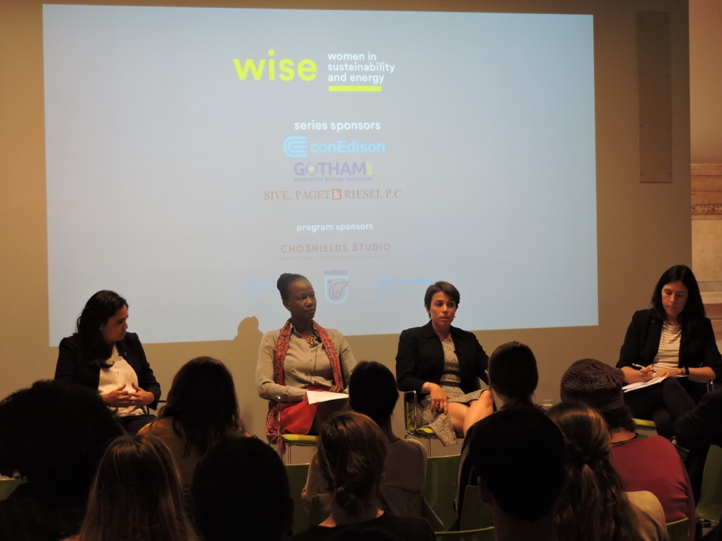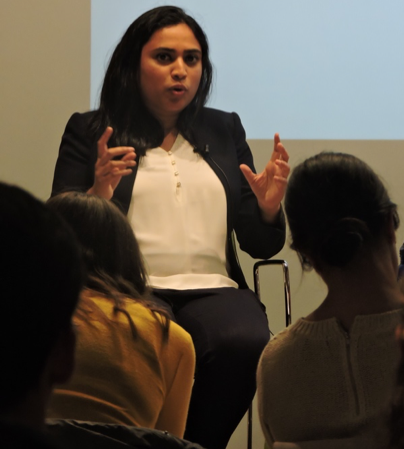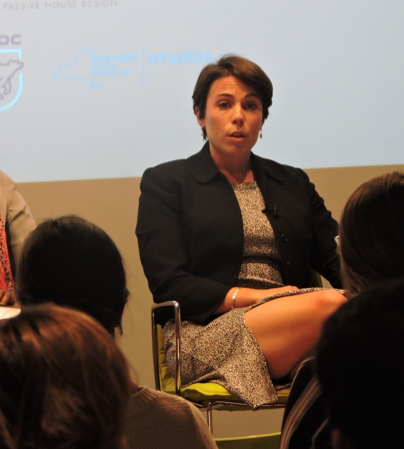By Becky Kalish, Programs Associate, BE-Ex
—
The latest addition of our Women in Sustainability (WISE) series, “WISE Tackles the Climate Mobilization Act”, occurred on Thursday evening, October 10. Building Energy Exchange hosted three WISE panelists in a discussion on the nuts and bolts of the Climate Mobilization Act (CMA), specifically Local Law 97 (LL97). The event had an outstanding turnout, with attendees coming from a variety of industries and possessing a wide spread of interests. Sydney Mainster, Director of Sustainability at The Durst Organization, moderated the event, ensuring that both the opportunities and the challenges of the CMA and Local Law 97 were discussed. Panelists included Alexis Saba, Associate at environmental law firm Sive, Paget & Riesel, Fatou Jabbie, Founder of sustainable consulting firm USL Technology, and Erangi Dias, Director of Business Development at non-profit lender NYCEEC.

From left to right: Erangi Dias, Fatou Jabbie, Alexis Saba, Sydney Mainster
Sydney began the discussion by giving a brief overview of the CMA, describing it as a group of local laws intended to shepherd progress towards achieving the City’s 80×50 carbon reduction goals for the city, and also noting that the act still has a number of components left unclear. Local Law 97, a law imposing greenhouse gas limits on buildings over 25,000 square feet, was a particular focus of the evening. Each panelist spoke towards how each of their specific industries would be affected by the regulations. According to Alexis, lawyers are good at coming together, solving problems, and making the law work well: fact-checking and determination behind the law is vital for significant progress around Local Law 97 to occur. Fatou went on to speak towards the notion that there is a lot of historical data out there to look at, and the data must be sifted through to see how it can be improved; building owners must take a look at their building’s performance before they can fully evaluate their Local Law 97’s obligations. Capital is a key piece of the puzzle, as explained by Erangi; NYCEEC is critical in the process as they provide funding for projects that aim to reduce greenhouse gas emissions.

Erangi Dias; NYCEEC

Alexis Saba; Sive, Paget & Riesel
All in all, the new local laws have incited a fresh sense of energy and excitement, one that had not existed previously—Erangi claimed that this heightened urgency and excitement can likely be tied to the fact that there is now a deadline, path, and incentives for buildings to meet LL97 obligations. Alexis said, “This is the 11th hour, and we are in a global movement to take on climate change”. Fatou declared that there is “a lot of opportunity to engage and educate, and one must set goals in chunks…innovation and forward thinking is needed to achieve the necessary goals”.
One major takeaway from this talk was that in order to comply with LL97, it is crucial to engage people who have expertise in different areas. When we collaborate with experts across multiple fields, the most optimal ideas and solutions will come out of it, and we must put trust in these experts to give us appropriate insight and answers. We must engage and educate; there are solutions that work, and it is up to us to find the right experts to explain them to us. Sydney ended the panel discussion with the following summary: “We know what works and that the technology exists; there’s financing for this technology that exists, but you need to do your homework, figure out how your building is performing, and then we have the legal team that will get us through the mud. Even though we don’t know all the ins and outs of the laws yet, we have help that will help us see through it”.
View the full event recording below and visit our events page to learn about upcoming WISE events!